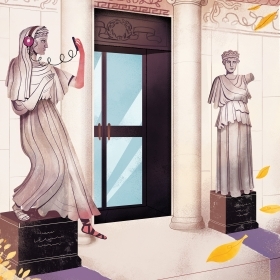Since Cord Whitaker’s childhood, growing up in the African Methodist Episcopal (AME) Church, and throughout his scholarship on African-American literature, medieval literature, and religion, he has been studying how the Middle Ages helped produce our understanding of race today.
Photo by Richard Howard
Think back to the February flare-up over Beyoncé’s single, “Formation,” on the afternoon before her Super Bowl Sunday performance. In the media firestorm that followed the video’s surprise release, critics picked apart its images of post-Katrina New Orleans, themes of police brutality, and Queen Bey’s statement on race and identity in the Black Lives Matter era. Like everyone else with a Wi-Fi signal and a pulse on social media, Wellesley’s Cord Whitaker watched and rewatched the video, then watched it again. He devoured the criticism it kicked up. But in the public discourse, Whitaker noticed something significant was missing: “What struck me as a major omission was the fact that no one was talking about the religious implications of this piece,” he says.
Whitaker’s teaching at Wellesley focuses on the literature and language of the Middle Ages, late medieval romance, and the medieval development of race. Since childhood, growing up in the African Methodist Episcopal (AME) Church, and throughout his scholarship on African-American literature, medieval literature, and religion, Whitaker has been studying how the Middle Ages helped produce our understanding of race today. All of which gave him a unique perspective that wasn’t reflected in the “Formation” firestorm.
“I couldn’t help but write about it,” Whitaker says. Within days, he had produced a post called “Beyoncé’s ‘Formation’ and Black Religious Transcendence,” on the blog What Is Racial Difference, which he maintains with an English class of the same name. He later expanded on his ideas in an on-campus lecture.
‘Learning to speak and read Middle English made me a better and more attentive reader of, for example, Toni Morrison’s work.’
His analysis of the video pays particular attention to one scene in which Beyoncé “is dressed in a way that I think is evocative of a New Orleans magic woman, a female practitioner of syncretic Africanist religion, while flanked by a number of men dressed in what I take as various takes on black respectability attire,” he says. We glimpse charismatic worship; a red fez, which might symbolize Islam. Bey’s head bobs under a big-brimmed church-lady hat, maybe channeling the spirit, Whitaker says.
He points out the historic significance of New Orleans—the setting of the video—in African-American religious practice and more broadly in the diaspora. “In the 19th century, in the early 20th century, Mardi Gras served a very important role in African-American spiritual and political culture,” Whitaker says. “Although it’s been secularized, Mardi Gras was how you made political statements, quite often dangerous statements about race and justice in ways that could be highly critical of the powers that be, but not get [you] lynched.”
In his English classes, as in his “Formation” analysis and his scholarship in general, Whitaker aims to bridge connections between modernity and the past. The AME Church introduced him to 18th-century language through liturgy. “From a very young age, I had to sit and think about the differences between ‘thee’ and ‘thou’ and the modern ‘you,’” he says. Later on at Yale, the intersection of religion, African-American literature, and medieval literature sparked his interest in even older forms of written work. “Learning to speak and read Middle English made me a better and more attentive reader of, for example, Toni Morrison’s work,” he says.
These linkages between medieval and modern and the ways they inform one another provide significant fodder for Whitaker’s research. Even as he finishes one book, Black Metaphors: Race, Religion, and Rhetoric in the Literature of Late Medieval England, he is at work on the next, which will examine medievalism in the work of Harlem Renaissance writers, including Jessie Redmon Fauset. “Most scholars who have treated her work are trained as modernists and African-Americanists,” he says, “and they haven’t dealt with the medievalism in it.” This is Whitaker’s particular perspective in its essence, his faculty for finding the past in the present that the rest of us may miss.
